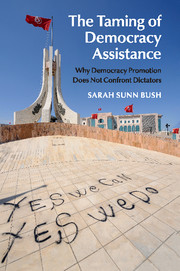Book contents
- Frontmatter
- Contents
- List of figures
- List of tables
- Preface
- List of abbreviations
- Part I Introduction and argument
- Part II Testing the argument
- 4 Delegation and the allocation of democracy assistance
- 5 Changes in American grant-making
- 6 Creating the democracy establishment
- 7 Jordan: aid in the shadow of geopolitics
- 8 Tunisia: reform after revolution
- Part III Conclusions
- Part IV Appendices and references
7 - Jordan: aid in the shadow of geopolitics
from Part II - Testing the argument
Published online by Cambridge University Press: 05 May 2015
- Frontmatter
- Contents
- List of figures
- List of tables
- Preface
- List of abbreviations
- Part I Introduction and argument
- Part II Testing the argument
- 4 Delegation and the allocation of democracy assistance
- 5 Changes in American grant-making
- 6 Creating the democracy establishment
- 7 Jordan: aid in the shadow of geopolitics
- 8 Tunisia: reform after revolution
- Part III Conclusions
- Part IV Appendices and references
Summary
[We must] be discerningly aware of the difference between the required democratic transformations and achievable ones on the one hand, and the risks of chaos and fitna [sedition] on the other.
We can't have a strategy as an NGO because we're just trying to survive in a situation with a lot of pressures. We can't plan if we don't know what our funding opportunities will be in the future. And we can't plan if we don't know what the government will allow.
According to Steven Heydemann at the United States Institute of Peace, who was writing prior to the Arab uprisings, democracy assistance in the Middle East has failed. Instead of promoting reform, he argues that international efforts have shaped strategies of authoritarian survival, creating a situation in which rulers adopt the language but not the substance of democracy. King Abdullah of Jordan, who held onto power more easily than other Arab leaders during the upheavals of 2011, has been especially adept at this strategy. His approach blended promises to reform and government shake-ups at home with pleas for more aid to sustain his regime abroad.
Heydemann is not alone in his pessimistic assessments of democracy aid in the Middle East. But why have external actors promoted democracy in the ways they have if Arab dictators know how to use elections and other seemingly democratic institutions to their advantage? To design more effective democracy assistance, it is important to understand what factors cause democracy promoters to select certain programs and not others in the first place.
To understand the factors that shape democracy assistance in the Middle East and beyond, this chapter presents a case study of Jordan between 2008 and 2012. It tests the theory I laid out in Chapter 2 using evidence drawn from more than seventy-five semi-structured interviews, participant observation, organizational materials, news articles, and secondary research.
- Type
- Chapter
- Information
- The Taming of Democracy AssistanceWhy Democracy Promotion Does Not Confront Dictators, pp. 159 - 186Publisher: Cambridge University PressPrint publication year: 2015

